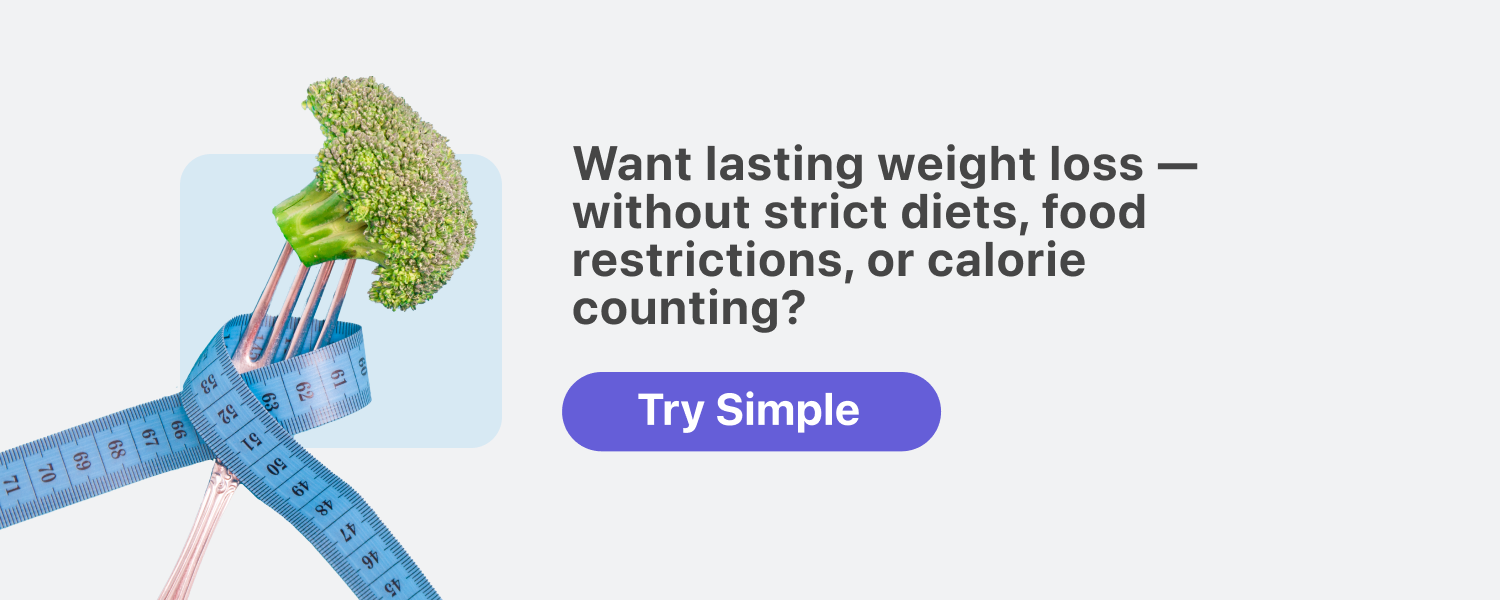Ways to avoid these 6 intermittent fasting mistakes

Ready to start your intermittent fasting lifestyle? Great! Intermittent fasting can be just what the doctor ordered for you to start shedding excess body fat and improve your health.

It’s normal to make lots of mistakes as we learn. As you explore intermittent fasting, you’ll discover the approach that works for you — and likely have lots of trial and error along the way.
That said, let’s save you some time and effort by helping you avoid six of the most common intermittent fasting errors:
- Choosing a plan that doesn’t suit you.
- Choosing foods that don’t nourish you during your eating window or eating more than your body needs.
- Not fueling properly before your fast.
- Not drinking enough water.
- Not supporting your fasting efforts with other lifestyle choices.
- Giving up too quickly.
(BTW, if you’re new to this whole idea of intermittent fasting and looking to get started, check out our guide to intermittent fasting for beginners. Then, once you’ve done that, take our Simple quiz, and we’ll help you get your fasting journey started!)
Now that we’ve covered the common missteps, let’s shift to what you can do to make your fasting experience a fruitful one.

1. Choose a schedule that works for you.
There are many types of intermittent fasting schedules.
But in general, intermittent fasting means there’s a “fasting window” — aka a period of time lasting about 12 hours or more when you don’t eat and don’t consume drinks with calories. Then, there’s an “eating window” during which you do eat.
It can be tempting to think that more is better when it comes to fasting or to choose a schedule that someone else — perhaps a well-known celebrity or your best friend’s mom’s aunt — recommended.
However, your body, schedule, and life are unique! So your intermittent fasting needs are, too.
Plus, there’s no evidence to show that fasting beyond 18 hours has any additional benefits at this stage.
Success tips:
Choose a schedule that reflects:
- your comfort and familiarity with intermittent fasting (e.g., beginner or advanced?)
- your daily-life routine (e.g., do you work shift work?)
- your preferences (e.g., is a family dinner together important to you?)
Do your research and find an intermittent fasting schedule that works best for your needs.
The Simple app is a handy tool for setting up a fasting schedule that’s both suitable for you and flexible enough to adjust to your lifestyle. Not sure which intermittent fasting schedule to choose? Take our Simple quiz, and we can help you figure out the best schedule for your unique body, preferences, and lifestyle.
2. Make wise food choices when you do eat.

Think about fasting and eating as two sides of a coin.
While fasting, your body is doing some important work, such as cleaning out cellular waste (aka autophagy), bringing down your insulin levels, and helping your body burn fat for energy.
So, when it’s time to eat, you’ll want to support all of your body’s hard work with wise food choices.
Success tips:
- Have a plan for how and what you’ll eat to break your fast.
- Consider preparing a healthy fruit- or veggie-packed meal that’s ready to eat once your fast ends.
- When you eat, slow down and pay attention to tastes and textures. Chew your food well and take breaks to digest and sip water. This will ensure you feel satisfied with your meal but not over-stuffed.
- If you’re looking to lose fat, you’ll also want to ensure that you’re eating fewer calories (while still eating enough protein and fiber!).
If you’re looking for some extra guidance on making smart food choices, log your meals with your Simple app to get personalized insights on how much and what to eat for your goals.
3. Fuel your fast properly.
You can ease your fast with the right food choices. For example:
- High-fiber foods help bulk up food and increase satiety (or the feeling of fullness). These include:
- fruits and vegetables
- whole grains
- beans and legumes
- nuts and seeds
- High-protein foods increase levels of satiety hormones like cholecystokinin (CCK).[1] These include:
- lean animal protein like beef, pork, poultry, fish, seafood, eggs, and low-fat dairy products
- plant-based proteins like tofu, tempeh, unsalted nuts like almonds, and pulses including lentils and chickpeas
While mild to moderate hunger is normal during a fast, choosing the right foods during your eating window can help ensure you have sustainable energy and don’t find yourself feeling ravenous.
Success tips:
- Opt for plenty of healthy foods during your eating window.
- Limit refined carbohydrates, like sugars, and processed foods.
Still not sure what to eat? Ask our assistant Avo for healthy meal ideas! Plus, check out our “What to eat during intermittent fasting guide” for even more inspo.
4. Drink plenty of water.

Did you know that your body is composed of almost 70% water?[2] With water content that high, you need to consume large amounts of water to stay hydrated.[2]
However, not all of your water consumption comes from the H2O you drink. Approximately 20% to 30% of your daily water intake comes from the food you eat.[2] So, you need to increase your water intake while you fast to make up for the water lost from your diet.
Water can also help manage your appetite while fasting. To learn more, check out our guide on “What can you drink while intermittent fasting?”
Success tips:
- Hydrate, hydrate, hydrate.
- Start your day with a glass of water before drinking any coffee or caffeinated beverages.
To give you even more of a leg-up in the hydration game, take our Simple quiz and get your hands on our hydration tracker (as well as a fasting buddy). We’ll send you reminders to drink, which can be your cue to get your H2O on!
5. Support fasting with your other lifestyle choices.
Healthy lifestyle behaviors play well together and rev up your chances of reaching your goals even more!
- Exercise helps you maintain a healthy metabolism, build important lean mass, and stay functional for life. It helps boost mental and emotional health too!
- Sleep helps you repair and recover, but it also helps regulate your metabolism and appetite.
- Managing stress helps you stay calm and avoid emotional or stress-related eating.
- Connecting with others — like friends, family, or even just the folks at your group exercise class — helps support your health goals and your psychological health. Plus, you might even find a workout buddy!
Success tips:
- Treat intermittent fasting as a lifestyle, not a diet.
- Focus on choosing nourishing foods, drinking enough water, and building a relaxing wind-down routine before bed to help increase your chances of a good night’s sleep.
- If you like, try exercising during intermittent fasting.
For even more support from like-minded people, check out our Simple community on Facebook.
6. Stay patient and persistent.
Our bodies aren’t machines. They have normal ups and downs, and it takes time to lose weight, even with the best possible nutrition, exercise, fasting, and lifestyle program.
So — ignore all the “overnight weight loss” and “3-week transformation” ads and “too-good-to-be true success stories” on social media. Instead, be patient, persistent, and as consistent as possible with your healthy habits.
You might lose some water weight or feel less bloated right away, but over time, weight loss will slow down. This is normal.
Losing fat slowly while practicing the right behaviors gives you the best chance of sustaining weight loss for life once you’ve reached your goal.
Success tips:
- Give yourself and your body time to adapt to the new routine. And then repeat, repeat, repeat.
- If weight loss has stalled for a few weeks, try tracking what you eat with the Simple food journal to get personalized insights. Often, with a few small adjustments, you’ll be on your way to weight loss again.
Remember that fasting and healthy eating are two sides of the same coin, helping you reach your goals. If losing weight is your goal, choose foods that nourish your body while not overeating.
Fasting is just a period of not eating that helps you become more mindful of your hunger, appetite, and food choices — not a nutritional “anything goes” card.
Be kind to yourself. Fasting is a lifestyle, not a set of rigid rules.
Get back to your fasting schedule as planned tomorrow, or adjust it if necessary. Consistency over time is more important than occasional slip-ups.
First, recognize that mild to moderate hunger is normal. Your body is letting you know that it would like some energy and nutrients.
Take a deep breath. Imagine calmly letting your body know that you’ll get to it in a little while and that you’re safe and OK.
Have some water (or black coffee / tea), and keep busy (or go to bed if it’s time).
If you’re really hungry, eat. That’s OK, too.
Listen to your body’s hunger cues and adjust your fasting schedule as needed. For more info, check out our guide on how not to feel hungry when fasting.

